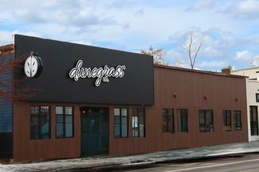
Two Housing Solutions, Little Funding
Deed restriction and ADU programs need dollars to get off the ground in Charlevoix
By Art Bukowski | Sept. 21, 2024
For a community to be vibrant and active in all four seasons, people need housing that’s available year-round. If employers hope to attract and retain workers, those workers need places to live. If small businesses want to blunt the effects of seasonality, full-time residents will help ensure that customers are available all the time.
Sense a pattern? Unfortunately, many northern Michigan communities are struggling with a housing stock that’s moving in the opposite direction. The proliferation of online rental platforms like Airbnb has caused a new appetite for the often very profitable practice of short-term renting, which limits the amount of year-round housing available.
While many northern Michigan communities are taking steps to restrict where and when short-term rentals are allowed, a public-private partnership in Charlevoix is attempting to turn the tide by pulling a few more tools out of the toolbox in an effort to protect and preserve year-round housing.
Those tools include deed restrictions and accessory dwelling units (ADUs), and with them, they hope to increase the year-round housing stock in the city of Charlevoix from around 38 percent now to 50 percent in the near future.
Neither Affordable Nor Available
While the talk of the growing housing problem across the region and state often centers on so-called “workforce housing,” those involved in the Charlevoix initiative stress that year-round housing is a need for everyone.
“This is not a question of how we make sure we have enough people to get tasks done,” says Charlevoix City Manager Mark Heydlauff. “It’s how do we make sure people are living the life they want to live in our community? We look at this from the whole spectrum to make sure people have the housing they need, regardless of why they need it or what their purpose is for being here.”
Charlevoix County’s area median income is just under $70,000 (and only about $30,000 in the city itself) but growth in those numbers has not even come close to keeping pace with skyrocketing home prices. The average Charlevoix County home is now just over $400,000, nearly double what it was just seven years ago.
Numbers like these contributed to a lack of year-round housing by encouraging more rental activity while simultaneously pricing out a very large portion of the population that’s seeking housing. So not only are the houses expensive, they often aren’t even available to rent or buy for those who could afford the price tag.
Exploring Deed Restrictions
A deed restriction is a provision in a property deed that imposes some sort of limitation on how a piece of property can be used, usually permanently, with the restriction staying in place regardless of future owners.
Deed restrictions are used to achieve a variety of outcomes, and they can be used to ensure that a home is permanently available for year-round housing. Aspen and several other vacation-heavy communities out West use deed restrictions to ensure properties remain affordable or available year-round (two related but separate issues).
A few years back, Housing North launched a year-round deed restriction program in Charlevoix with hopes of expanding it elsewhere in the region. So far, they have six deed restricted properties—one single family home and five apartments—and hope to get more.
“The program is great, and we need it in our region, but we’re really hesitant to grow it without having a funding source,” says Yarrow Brown, executive director of Housing North.
Funding would allow Housing North to purchase these deed restrictions instead of relying on them being donated. Because permanently restricting the way a property is used diminishes its value, many property owners want a cash payment up front to at least partially offset the reduced property value.
Payments of some form are part of most of the programs out West, and are a key component of similar tools that restrict the way land is used. Land conservancies use conservation easements to permanently protect properties from development, for example, but those easements (which are deed restrictions) are often purchased.
In the instances these easements are not purchased, landowners still often get hefty tax benefits from donating them. Unfortunately, Brown says, year-round housing deed restriction donations do not carry the same benefits.
It’s possible that a deed restriction program could be supported by a public millage. Peninsula Township and Acme Township in Grand Traverse County both have purchase of development rights (PDR) programs, in which voters approve a tax that allows the township to buy and permanently eliminate the development rights of a property.
“I think it’s time to step up in our communities and put public dollars [towards this],” Brown says.
Brown points out that these deed restrictions don’t mean that a property owner can never leave or rent out their property for brief periods of time. It simply must remain in full-time use by the homeowner (homestead vs. non homestead, for tax purposes). A property owner could still leave for up to two months under the terms of the deed restriction.
Building Accessory Dwelling Units
ADUs are small, secondary living units that are on the same lot as a property owner’s main house. They are sometimes an apartment within a home, but can also consist of a standalone structure apart from the main house or above a detached garage.
ADUs can help meet the demand for housing by creating additional spaces for people to live. Because they can provide supplemental income to the property owner, they also make the financial sense required for homeowners to pursue them. Housing North says young people who work in local businesses, older adults who want to downsize, and lower- and middle-income households can benefit from this housing type.
Housing North has a variety of resources available, including detailed land-use maps for the cities of Charlevoix, East Jordan, and Boyne City identifying where ADUs are permitted under zoning, free access to several ADU designs that meet local building codes, and information on financing, building, and renting an ADU, as well as contact information for local zoning and building officials to assist in the process.
Again, however, funding is a problem. Building even a small structure can cost $100,000 or more, and Brown believes the program is unlikely to really take off without a way to offer some sort of financial assistance. Three ADUs have been built in Charlevoix in recent years, Brown says. Better than nothing, but more will be needed to truly make a dent in the problem.
“Phase two right now is figuring out how to…create a financing mechanism or more support,” she says. “So we’re looking at low-interest loans, relationships with banks, grant funding that would incentivize it.”
Conversations are ongoing with foundations, banks, and other financial institutions, Brown says.
“Maybe you … would invest in ADU if you knew there was a 2 percent interest loan,” she says. “I think there’s a lot of banks in our region that want to help with housing. There are some limitations because of how they spend their funds, but I am hoping in the next year we can hopefully crack this nut a little bit more.”
For more information about both programs and other housing initiatives, visit HousingNorth.org.
Trending

Michigan’s Marijuana Tax at Work
Cannabis has become a big business in northern Michigan, and local governments are putting tax dollars earned from dispensar… Read More >>
California Sober: Why People Are Switching from Alcohol to Weed
They call it “California sober.” Generally speaking, this term applies to folks who use marijuana but abstain f… Read More >>
The Legacy of Student Activism
“It’s a physical letter to your representative,” Alex Tank says when asked to define the word “prote… Read More >>


